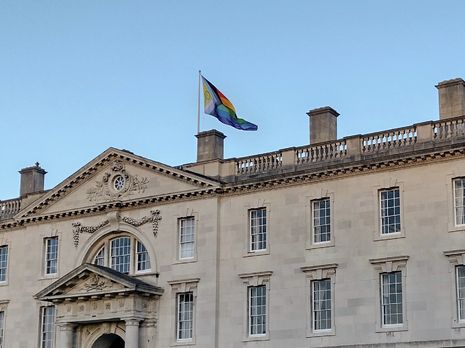Beyond the queer love story
Alexander Brian meets the organisers of two of Cambridge’s queer film nights to explore the importance of more realistic representation, beyond the stock romance story

This week, Varsity has been covering all things Valentine’s Day. One group that is often overlooked during this celebration of romance is the LGBTQ+ community. Although queer love stories are only beginning to enter the mainstream media, they are playing a vital role in challenging society’s cisheteronormativity. But are they the be all and end all? I discussed all this and more with Sidney Sussex’s LGBTQ+ officer, SF, and Kai, an SU aro/ace representative.
“We all make fun of Love Simon now and that’s because it’s shit but seeing that in cinemas was crazy”
Both students use film nights as a way of gathering their communities. Kai views these events as an unintimidating environment in which to meet new people. For SF, they are also an intellectual opportunity: “They fulfil my role as LGBT officer but also mean I get to show people my favourite films and talk about them.”
During her first term in the role , SF agonised over which films to show: “I was like, I need international ones, I need ones with women, and I need ones which cover every letter in the acronym.” Consequently, the event became more of an intersectional film night, with movies ranging from I Dream In Another Language (2017) – a Mexican independent film about the relationship between the last two speakers of an endangered language - to Paris is Burning (1990) – a documentary film about the ball culture in 1980s New York. This term, SF admits, she hasn’t been so diligent: “I was like, ’I want to watch Pride’ and then I googled ‘queer films’ and that’s how I chose the second one.”
For aspec film night, there is a Discord server dedicated to movie suggestions. Films mentioned include Nimona (2023), a comic-book adaptation exploring transness through a shapeshifting character, and Moana (2016). “A lot of the other films are just trashy action films because that’s what I like,” Kai laughs.
Representation is crucial for the LGBTQ+ community, SF explains: “We all make fun of Love Simon now and that’s because it’s shit but seeing that in cinemas was crazy. I remember all my friends crying. It was such a huge thing.” Nevertheless, as representation has improved, it has started to feel less important for SF.
“The necessity of representation is still very raw for asexual and aromantic people”
Conversely, the necessity of representation is still very raw for asexual and aromantic people, for whom there is practically none. Kai cites SpongeBob, Heartstopper and Shadowhunters. Yet, aside from Todd Chavez in BoJack Horseman, whose asexuality is a recurring plot point, representation generally consists of a throwaway line or retrospective acknowledgement. Often, it merely reinforces existing stereotypes, as evident from shows about ‘curing’ asexuality like The Olivia Experiment (2012) and sociopathic characters like Sherlock, who some refer to as asexual as a joke.
Representation is especially important for aspec people as they receive such little visibility in real life. “Before I came to university, I’d met one or two other people on the ace spectrum,” Kai explains. As more and more people are discovering their asexuality via the Internet, mainstream media representation is essential for making it feel like “less of a weird online thing.”
“There’s still quite a lack of understanding among the general public of what asexuality and aromanticism are,” Kai acknowledges. “Having to do the TED talk for everyone, it’s really tiring and makes coming out more difficult.” Not only would representation ease this pressure, but it would also reduce the other challenges aspec people face, including bullying and a vulnerability to abusive relationships.
“Both students stress the need for more stories about trans and non-binary joy”
I ask SF whether she has noticed any changes in queer representation lately. She believes it has become “trashier”: “I watched Red, White & Royal Blue recently. What a load of shite. I enjoyed it so much.” So, what does good representation mean to her? According to SF, queer characters no longer need to be “perfectly representative and well-behaved and have the perfect vocabulary to explain who they are.” As long as they are “based on our own stories and experiences”, they are allowed to be “imperfect and confused.”
“A lot of queer media is very much focused on gay men and I think that’s unfortunate,” she continues. Both students stress the need for more stories about trans and non-binary joy as well as greater representation of queer people of colour. “There’s starting to be a realisation that we need to see more disabled people on screen and it not be an obstacle they have to overcome,” Kai adds, while SF stresses the comforting nature of films about older queer people.
For SF, “What makes a love story compelling is the struggle, which is why queer love stories are often so compelling.” But must queer stories always be about love? “No!” she retorts immediately, “I would love to see more stuff about queer people just being queer.”
Kai goes further, suggesting that society’s obsession with the love story harms everyone as “you cannot expect one person to meet all your emotional needs.” They also emphasise the link between allonormativity and misogyny: “With the rise of feminism, women are not getting into relationships as much because they are empowered financially to just live their best life.”
Consequently, Kai doesn’t understand the stress some of their friends feel around Valentine’s Day: “If you’re in a loving relationship, you don’t need a special day to go on dates and give them gifts.” Instead, they strongly recommend organising dates with friends. SF, however, loves Valentine’s Day and wants queer people to be able to relate to the celebration as much as anyone else. “I just really like heart-shaped things,” she laughs.
Both students have upcoming film nights in Sidney JCR: SF on 4/03 at 6pm, Kai on 20/02 at 6pm.
 News / Colleges charge different rents for the same Castle Street accommodation2 March 2026
News / Colleges charge different rents for the same Castle Street accommodation2 March 2026 News / King’s hosts open iftar for Ramadan3 March 2026
News / King’s hosts open iftar for Ramadan3 March 2026 Theatre / Lunatics and leisure centres 4 March 2026
Theatre / Lunatics and leisure centres 4 March 2026 News / Angela Merkel among Cambridge honorary degree nominees27 February 2026
News / Angela Merkel among Cambridge honorary degree nominees27 February 2026 News / News in Brief: waterworks, wine woes, and workplace wins 1 March 2026
News / News in Brief: waterworks, wine woes, and workplace wins 1 March 2026








